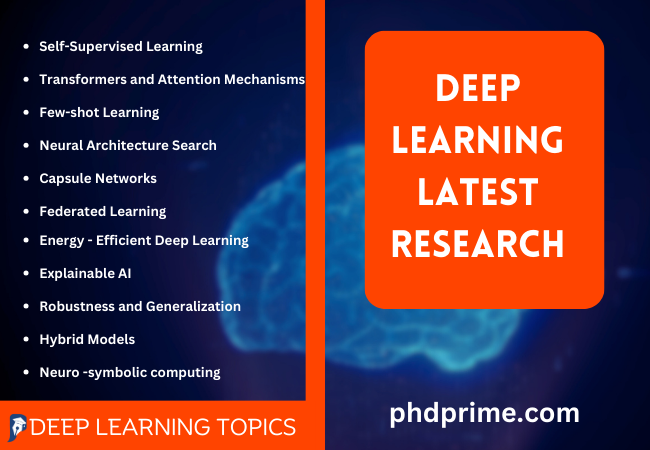Deep learning makes progress through new advancements so a skill full approaches and process is required with the lot of developments. We refer the leading journals as IEEE so that the in-between gaps that are left can be filled up by our experts’ ideas. Simulation is done by our programming team who have more than 15+ years of experience and they derive a detailed solution.
The following are some remarkable topics and the area of interest in deep learning that we deal are,
- Transformers and Attention Mechanisms: We use these mechanisms to utilize architectures like BERT and GPT which are derived from the NLP (Natural language Processing). The transformers make adjusting for numerous domains like ViT (Vision Transformers) and integrated modalities too.
- Self-Supervised Learning: This kind of learning held without the extensive labelled data. By using tasks, the label is essential to input. E.g.., predicting a masked -out part of an image.
- Few-shot Learning: In this type of learning, we apply the techniques allowed the models to make some examples of each with suitable prediction.

- Neural Architecture Search (NAS): This architecture uses machine learning to find the best neural network and the machine learning models being automated for a given problem.
- Capsule Networks: The goal of capsule network is to solve the issues in Convolutional neural networks (CNNs) similar to spatial hierarchies’ in-between features.
- Federated Learning: To train machine learning models, the data is being localized across several devices or servers and it addressing our privacy concerns.
- Energy – Efficient Deep Learning: As the deep learning models are numerous in sizes, our researchers are evolving the models with more energy -efficient and that gains attraction.
- Explainable AI (XAI): The XAI undergoes technique to make accurate decision of deep learning models and that should be explainable and understandable by humans.
- Robustness and Generalization: On the process of making models in research, it is more powerful to tackle adversial attacks. Generalization capabilities had been improved for unseen data.
- Generative Adversarial Network (GANs): This network is being continuously advanced in GAN architectures and their application make great effect in image synthesis, data augmentation, etc..
- Neuro -symbolic computing: This computing process involves in integrating the deep learning and symbolic reasoning to control the strength of both.
- Large-scale Pre-training: We train the huge models on vast datasets and fine tuning them to do specific tasks, similar to the models like Open AI’s and GPT-3.
- Bias and Fairness: To ensure fairness, we address and reduces the risk for bias in deep learning models and it’s particularly aim in high stakes applications like health care or finance.
- Hybrid Models: These models are combining deep learning with other AI techniques like reinforcement learning, the performing task be like game playing or robotics.
- Multimodal Learning: The learning is based on collecting or gathering information’s from various sources and modalities such as Combining vision and text.
Consider the following strategies to get stay updated with latest trends in deep learning,
ArXiv:
The preprint server frequently publishes the latest research trends in several fields which includes deep learning. The sections cs.LG (Learning) and cs.CV (Computer Vision) are relevant to each other.
Conferences:
We should follow the proceedings from the leading AI and machine learning conferences like NeurIPS, ICML, ICLR, ACL, CVPR, ECCV, etc.
Blogs & Newsletters:
Many researchers and organizations are being maintained the journals to discuss and analyse the current developments. The Newsletters like “The Batch” from deeplearning.ai, “Import AI” by Jack Clark, and “Last Week in AI” are also beneficial.
Research Groups:
Stay tuned and keep up with publications from our leading research groups and labs like Google AI, OpenAI, DeepMind, Facebook AI Research (FAIR), and Microsoft Research.
Not to forget this, now-a-days deep learning enhanced its growth with latest advancements. So, engaging with our sources is a predominant way that will help you to stay updated with latest trends.
What are the most popular deep learning Projects?
The few listed are the topics that are in trend today get connected with us to experience our quality support. Plagiarism free paper with novel ideas will be shared for all PhD projects. Tailored projects are well handled by phdprime.com experts.
- Path planning of mobile robot based on deep reinforcement learning with transfer learning strategy
- Enabling Rewards for Reinforcement Learning in Laser Beam Welding processes through Deep Learning
- English Language Trainer for Non-Native Speakers using Audio Signal Processing, Reinforcement Learning, and Deep Learning
- Research on Deep Learning-based Cross-disciplinary Applications
- A Deep Learning Model with Adaptive Learning Rate for Fault Diagnosis
- Lethargy Detection during work using Keras Deep learning
- Large-scale Face Clustering Method Research Based on Deep Learning
- Investigating and predicting the dielectric performance of non-edible Natural Ester using LSTM-based deep learning model
- Accuracy Evaluation of Indoor Positioning by Received Signal Strength using Deep Learning
- Research on Laser Polarization Image Reconstruction Based on Wavelet Transform and Deep Learning
- On developing deep learning models with particle swarm optimization in the presence of poisoning attacks
- Survey on Intrusions Detection System using Deep learning in IoT Environment
- New Labeling Methods for Deep Learning Real-Valued Inter-Residue Distance Prediction
- Algorithm Optimization of Deep Reinforcement Learning for Traffic Signal Control of Municipal Road Engineering
- A New Deep Reinforcement Learning Algorithm for the Online Stochastic Profitable Tour Problem
- Deep Learning Toward Preventing Web Attacks
- Performance Comparison of Machine Learning and Deep Learning While Classifying Driver’s Cognitive State
- Synthetic Sensor Data Generation Exploiting Deep Learning Techniques and Multimodal Information
- Inverse Design of a Terahertz Metasurface with Split Ring Resonator Based on Deep Learning
- Lion Swarm Optimization with Deep Learning Driven Predictive Model on Blockchain Financial Product Return Rates





















